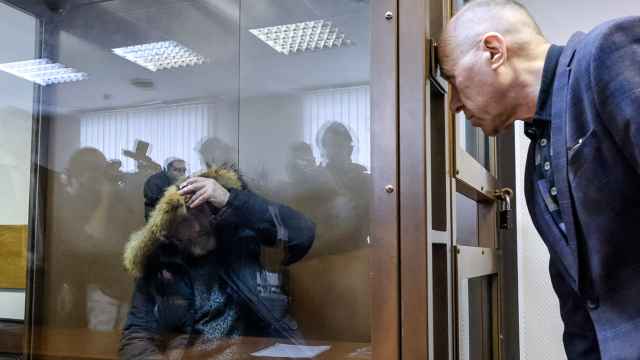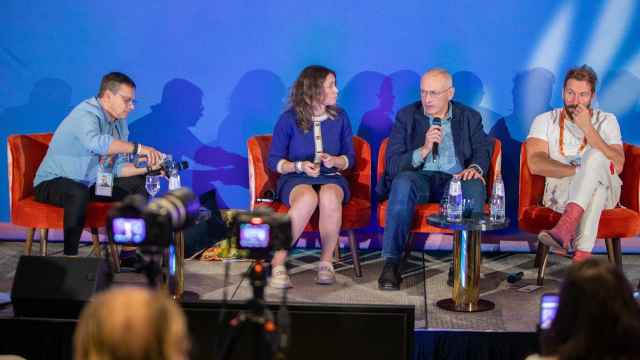A country's trade policy is supposed to maximize economic growth while keeping its foreign payments in reasonable balance. In reality, it might actually benefit the interests of entrenched elites at the expense of the growth and welfare of the nation. But Russia's current trade policy does neither. Instead it minimizes growth and maximizes public cost. The reason is its Customs Union with Belarus and Kazakhstan.
This is a new situation. From 1999 until 2008 — Russia's decade of 7 percent annual growth, increased international integration was one of the main sources of Russia's economic growth together with market economic reform, better utilization of its human capital and the commodity boom. All these sources of growth have now been exhausted. Strangely, the Kremlin is now hurting Russia's economy by leading the Group of 20 in imposing protectionist policies.
Two forces are driving Russia's trade policy — the Customs Union and the World Trade Organization, or WTO. In August 2012, Russia finally became a member of the WTO. Those of us who had supported Russia's membership had hoped this would contribute up to 1 percent of gross domestic product a year in additional growth. Most of the growth was supposed to derive from increased competition in services and more foreign direct investment. But that presupposed that Moscow played by the WTO rules. Instead, it ignores them. It has not even set up a permanent mission to the WTO in Geneva.
Strangely, instead of going global, the Kremlin has turned parochial with the Customs Union. After years of failed attempts at economic integration with a few post-Soviet nations, then-Prime Minister Vladimir Putin suddenly changed course in June 2009, less than a month after he had given up the presidency. It happened in the dreary industrial town of Pikalyovo in the Leningrad region, while President Dmitry Medvedev and the rest of the Russian government celebrated the St. Petersburg International Economic Forum.
Putin declared that Russia would join the WTO as a customs union. This came as a surprise to his cabinet, just as it seemed to be to the presidents of Belarus and Kazakhstan, who still accepted because of their dependence on Russia. They were confident that post-Soviet integration was going nowhere.
This time, however, the Kremlin was serious. The top international trade negotiators who had gathered in St. Petersburg had to go home without completing Russia's WTO accession, which was delayed by about two years. The whole multilateral protocol for WTO entry had to be rewritten and renegotiated with heroic efforts by EU and U.S. trade negotiators. It became obvious that the Customs Union was Putin's project, while Medvedev focused on the WTO.
The development of the Customs Union has proceeded with surprising speed. In 2010, it formally came into existence with common import tariffs and a joint customs code. It has established a secretariat, the Eurasian Economic Commission, in Moscow with more than 1,000 staffers. Each of the three countries receives an agreed share of the joint customs revenues.
Putin aspires to ever greater economic and political integration, contrary to the desires of Belarus and Kazakhstan. He speaks incessantly about his future political "Eurasian Union," while the Kazakhs say the "Eurasian Economic Union." Clearly, Putin's goal is political, while Belarus wants economic benefits and Kazakhstan just hopes to manage its complex relationship with Russia. Whereas Putin advocates fast expansion of the Customs Union, Belarus and Kazakhstan try to stall it. The economic and political damage caused by Putin's obsession with the Customs Union is substantial both to Russia and its neighbors.
The fundamental problems with the Customs Union are that it is protectionist and involuntary. When Kazakhstan joined the union, it had to almost double its customs tariffs from 5.3 percent to 9.5 percent on a trade-weighted basis. Thus, rather than generating more trade overall, the Customs Union diverts trade of these three countries to one another, which leads to a slight reduction of their welfare. In practice, this means that high customs tariffs to the outside world compels more Kazakhs to buy Russian-assembled cars rather than South Korean cars. The increases in tariffs are now blocking Kazakhstan from joining the WTO.
Although Belarus has joined the Customs Union, its economic relationship with Russia is tense. Belarussian President Alexander Lukashenko concentrates on extracting money from Russia, mainly in the form of subsidized oil and gas. He does so successfully to the tune of $10 billion a year, approximately 18 percent of Belarus' GDP, but this is a messy affair as Belarus escapes Russia's export taxes on oil. On Oct. 11, Lukashenko threatened that Belarus would leave the customs union if Russia did not abolish its demand to receive oil export duties of some $4 billion a year from Belarus, a move he claimed Putin had promised.
Food standards have not been harmonized within the Customs Union. Russia's real foreign minister in the former Soviet space is Gennady Onishchenko, officially the chief sanitary inspector. He has determined that Belarussian dairy must not be available to Russian consumers. Belarus and Russia are also pursuing a potash war as the Russian company Uralkali appears to be attempting to take over its former partner Belaruskali through a price battle. The outcome of the many Belarussian-Russian conflicts is uncertain, but Lukashenko usually calms down after having obtained his desired subsidies. Meanwhile, the Kazakhs would certainly cheer if Lukashenko managed to break up the Customs Union.
Putin is also trying to expand the Customs Union to Ukraine, Moldova, Armenia, Kyrgyzstan and Tajikistan. He is doing so with a combination of threats of trade war, financial sanctions, security threats, gas subsidies and investment commitments. Trade war general Onishchenko has sanctioned Georgian and Moldovan wines, Ukrainian chocolate, Lithuanian dairy and many other products.
The main purpose is to block Ukraine, Moldova, Georgia and Armenia from signing free trade agreements with the EU at its summit in Vilnius at the end of November. Armenia has given in because of Putin's threats to its security, while the others seem to be holding up the resistance. Belarus and Kazakhstan are spectacularly absent in these enlargement endeavors.
This Russian trade policy makes no sense and harms Russia's national interests. Politically, Putin is turning most post-Soviet states against his country, compelling them to seek security elsewhere. Economically, Russia is paying large subsidies while impeding the modernization of its economy. Legally, it is provoking WTO sanctions. Instead, Russia should open up its economy and render it more competitive by trying to conclude free trade agreements with the EU as everybody else is doing.
Anders Åslund is a senior fellow at the Peterson Institute for International Economics in Washington
A Message from The Moscow Times:
Dear readers,
We are facing unprecedented challenges. Russia's Prosecutor General's Office has designated The Moscow Times as an "undesirable" organization, criminalizing our work and putting our staff at risk of prosecution. This follows our earlier unjust labeling as a "foreign agent."
These actions are direct attempts to silence independent journalism in Russia. The authorities claim our work "discredits the decisions of the Russian leadership." We see things differently: we strive to provide accurate, unbiased reporting on Russia.
We, the journalists of The Moscow Times, refuse to be silenced. But to continue our work, we need your help.
Your support, no matter how small, makes a world of difference. If you can, please support us monthly starting from just $2. It's quick to set up, and every contribution makes a significant impact.
By supporting The Moscow Times, you're defending open, independent journalism in the face of repression. Thank you for standing with us.
Remind me later.





